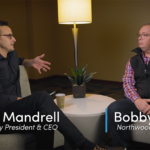According to Lifeway Research, 63% of pastors say they need to continue to invest in the area of disciple making, and 43% say they need to invest in administrative skills. Bobby Pell, pastor of Northwoods Church, joins Ben Mandrell, president and CEO of Lifeway Christian Resources, to discuss the Greatest Needs of Pastors study and skills pastors have to work on to develop.
By Staff
Ben Mandrell: Skill development has been identified as one of a pastor’s greatest needs. What is a specific skill related to the pastorate that you have had to work on to develop?
Bobby Pell: I’ll mention two. One is that I’m not an administrator by nature. By nature, I’m pretty unorganized.
Ben Mandrell: People-oriented.
Bobby Pell: Yeah. And I recognized early on that that was going to be a pinch point in the effectiveness of ministry if I did not improve. And I found administrative people and went and talked to them and learned some things that I needed to learn.
Ben Mandrell: You needed to get good enough to be dangerous.
Bobby Pell: That’s right. You can learn some administrative skills if you choose to. And I did because I needed to for the sake of the church.
Ben Mandrell: Talk a little bit about what you’ve learned about disciple making. Because I know this has become a big thing for you— not so much in early years— but now.
Bobby Pell: Our church discipled people by accident for many years. And today, I would say we have a broken process, but we have a process. And a lot of that has been watching what other churches do. But I would say over 80% of our adults and teenagers are in a disciple-making process right now. And that is happening through people either in one-on-one relationships, or they’re in groups of four or less. And I’m very grateful for that.
Ben Mandrell: It is cool that there is no one-size-fits-all for discipleship. We do have to have different hooks in the water and do it differently with different personalities and people. Sounds like you guys are figuring that out.
Bobby Pell: Yeah. And I think it’s broken. I mean, we don’t have a perfect disciple-making process, but we’re trying. My personality type can be a driver. And I think one of the things that I’ve learned is to not drive people. I’ve learned to coach people.
Ben Mandrell: Describe driving.
Bobby Pell: A teller. A direct, “You need to do things the way I want, when I want, how I want.” And I’ve really struggled with that as a pastor in the sense that Ephesians 4 is I’m to equip and enable you to be all God has wanted you to be within the body.
Ben Mandrell: Let them figure it out.
Bobby Pell: Let them figure it out. So I’ve had to learn how to be a good question-asker. And that was not natural. I’ve tried to become a good question-asker.
Ben Mandrell: That’s really good. My wife and I have always said that the conversation is the relationship. It really is true. Like the quality of conversations you have with people are based on the quality of the questions. I think it is a skill, as a pastor, to learn how to ask good questions and listen—not just tell them what to do.
Bobby Pell: Right. And you can learn it. Sometimes we end up saying, “Well, that’s just not who I am.” And I think that can be a cop-out because we can learn. We can learn how to ask good questions.
Ben Mandrell: Well, look what Jesus did. He always asked the questions. And very rarely supplied pat answers.








